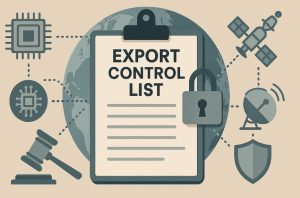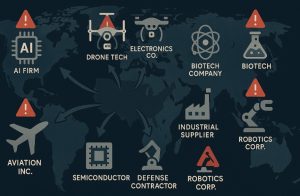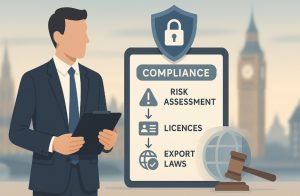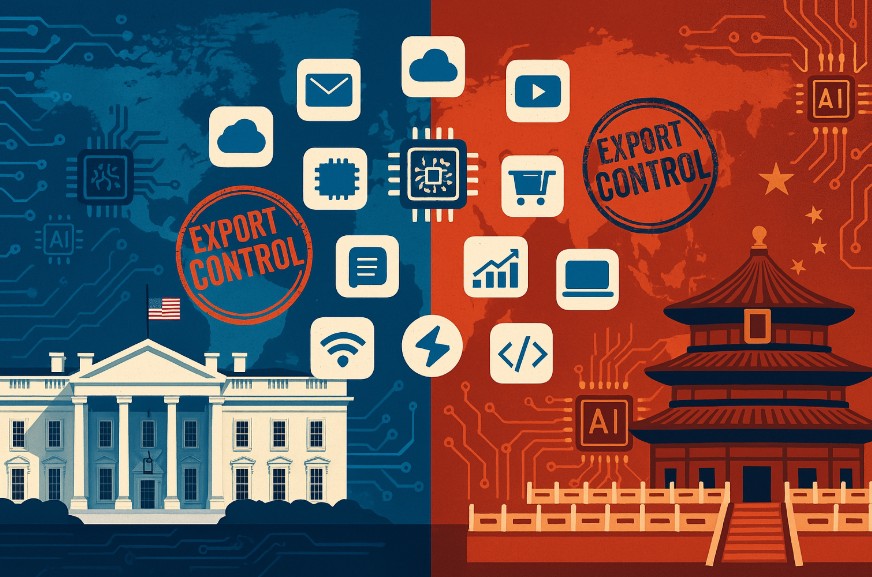Table of Contents
ToggleWhat happens when two global superpowers blacklist the same group of companies within days of each other?
The answer lies at the intersection of technology, geopolitics, and national security. In a powerful show of reciprocal enforcement, China and the United States have both added 12 American companies to their respective export control lists, citing threats to national interests and violations of international norms.
Announced by the U.S. Bureau of Industry and Security (BIS) and China’s Ministry of Commerce (MOFCOM), these decisions come amid increasing global scrutiny over the use of dual-use technologies, those with both civilian and military applications.
The move is not only a stark reminder of escalating US-China trade tensions but also a potential turning point in how emerging technologies are governed across borders.
For UK businesses, especially those in tech, defence, or advanced manufacturing, this development raises critical questions about compliance, operational risk, and the future of international trade partnerships.
In this blog, we explore who these companies are, why they’ve been sanctioned, what technologies are at stake, and how this geopolitical tug-of-war could affect the UK market.
What Is an Export Control List and Why Does It Matter?

In today’s tightly regulated global trade environment, export control lists are crucial instruments used by governments to safeguard national security and enforce international responsibilities.
These lists restrict or prohibit the export of sensitive goods, services, or technologies to individuals, companies, or countries considered potential threats.
In the United States, the Bureau of Industry and Security (BIS), under the US Department of Commerce, manages these controls. The BIS aims to prevent sensitive technologies, especially those with dual-use potential (civilian and military applications), from falling into the wrong hands.
However, the export control list is not a one-sided tool. In a significant geopolitical development, China’s Ministry of Commerce (MOFCOM) also announced that it had added 12 American entities to its own export control list, citing national security concerns and the enforcement of non-proliferation obligations.
Why Have These 12 American Companies Been Added to the Export Control List?
The US action to blacklist 12 domestic firms reflects rising concerns around technology transfers that could jeopardise national interests.
Many of the companies involved are engaged in advanced research or the manufacture of dual-use technologies, which could be repurposed for military or surveillance operations.
From China’s side, the decision to place 12 US firms on its export control list was presented as a defensive measure to “safeguard national security and interests.”
According to a MOFCOM spokesperson, the action is consistent with China’s Export Control Law and aims to enforce international commitments such as non-proliferation agreements.
China’s statement claimed that the listed American firms had engaged in activities that could endanger its national security.
These activities include arms sales to Taiwan and military-related technology cooperation, which, according to Chinese authorities, “seriously harm China’s sovereignty, security, and development interests.”
Who Are the 12 Companies and What Industries Do They Represent?

The American firms targeted by China and the US span a broad array of high-tech sectors. While the US has not publicly named all of the entities it has restricted, China has provided a detailed list of the companies it has sanctioned.
Here’s a comprehensive table summarising key companies added to China’s export control list, their industries, and the stated reasons:
| Company Name | Industry | Stated Reason (China’s MOFCOM) |
| American Photonics | Optoelectronics | Endangering national security |
| Novotech, Inc. | Biotechnology | Involvement in sensitive tech transfers |
| Echodyne | Radar Technology | Dual-use concerns |
| Marvin Engineering Company, Inc. | Aerospace & Defence | Ties with military systems |
| Exovera | Data Analytics | Threat to national interests |
| Teledyne Brown Engineering, Inc. | Defence Technology | Strategic technology risks |
| BRINC Drones, Inc. | Unmanned Aerial Vehicles | Drone-related exports |
| SYNEXXUS, Inc. | Tactical Communications | Military tech collaboration |
| Firestorm Labs, Inc. | AI & Autonomous Systems | Dual-use potential |
| Kratos Unmanned Aerial Systems | Aerospace and Defence | Arms cooperation with Taiwan |
| Domo Tactical Communications | Secure Communications | Potential surveillance misuse |
| Insitu, Inc. | Surveillance Drones | Participation in military activities |
China also moved six of these companies including Shield AI, Sierra Nevada Corporation, and Hudson Technologies Co, to its “unreliable entity list”, further restricting their operations in China from 12:01 on April 10.
Which Technologies Triggered the Export Control Restrictions?
At the core of both the US and China’s restrictions are emerging technologies with strategic importance. These include:
- Autonomous drones and AI-based military systems
- Quantum computing platforms with cryptographic applications
- Optoelectronic components used in advanced surveillance
- Tactical communications systems that could be used in warfare
Both nations expressed concern about how these innovations could be repurposed for military use or undermine national security when exported unchecked.
How Will These Export Controls Impact Global Trade?
The reciprocal actions from the US and China signal a shift from unilateral enforcement to tit-for-tat trade policy. These restrictions are likely to affect not only the companies involved but also their global partners, many of whom are based in Europe, including the UK.
Potential consequences for global trade include:
- Disruption to international supply chains
- Increased uncertainty for multinational collaborations
- Complex export licensing requirements
- Geopolitical tension that could affect global markets
UK companies that depend on dual-use components, particularly in aerospace, AI, and semiconductors, will need to reassess their supply chain risks.
What Do UK Businesses Need to Know About Compliance?

Given the widening scope of export restrictions on both sides, UK firms must adopt a proactive approach to compliance. This includes:
- Monitoring both US and Chinese export control updates
- Reviewing partnerships with any entities involved in dual-use goods
- Seeking legal advice on contracts that may be affected by new sanctions
- Training internal teams on export control regulations
- Applying for special licences where permissible
Non-compliance intentional or not could lead to fines, import-export bans, or even exclusion from international contracts.
What Could Happen Next in Terms of Policy and Enforcement?
Both the US and China have made it clear that they will continue using export controls to assert technological dominance and protect strategic interests.
MOFCOM’s spokesperson highlighted that actions against foreign entities are taken only when absolutely necessary and that the Chinese government still welcomes law-abiding companies to do business in China.
Future developments may include:
- Expansion of blacklists on both sides
- Tighter restrictions on AI, drones, and communication systems
- UK and EU governments issuing their own export advisories
- Emerging opportunities for non-aligned tech suppliers
Businesses must remain agile and anticipate regulatory changes by building real-time monitoring into their risk management frameworks.
How Does This Reflect Broader Trends in Global Trade and Security?
This new phase of mutual sanctions marks a significant turning point in how technological power intersects with national security.
Governments are moving from cooperation to containment, placing businesses, especially tech firms, at the centre of geopolitical strategy.
For the UK business community, especially startups and SMEs, this means:
- Greater need for compliance infrastructure
- Strategic evaluation of international partnerships
- Opportunities to innovate in neutral tech corridors
While the long-term impact remains uncertain, what’s clear is that global trade is becoming more politicised, and understanding these shifts is key to navigating the future.
FAQs on Export Control and Blacklisted Companies
What is the purpose of an export control list?
Export control lists restrict the export of sensitive technologies to protect national security and enforce international obligations such as non-proliferation.
What led China to blacklist the 12 US companies?
China’s Ministry of Commerce cited national security concerns, particularly around arms sales to Taiwan and unauthorised technology cooperation, as justification for the move.
Are both the US and China using export control lists now?
Yes. Both countries have implemented export control lists to restrict the flow of technologies they consider sensitive or strategically important.
How should UK businesses respond to these trade developments?
UK firms should strengthen compliance measures, monitor export control announcements, and review all high-tech partnerships or joint ventures involving affected firms.
What’s the unreliable entity list?
This is China’s equivalent of a blacklist, used to penalise foreign companies that act against its national security or economic interests.
Can exports to blacklisted firms ever be approved?
In special cases, exporters can apply for a licence or approval. However, such permissions are rarely granted and typically subject to strict controls.
What industries are most impacted?
Industries most affected include aerospace, defence, AI, cybersecurity, quantum computing, and dual-use communications technology.




